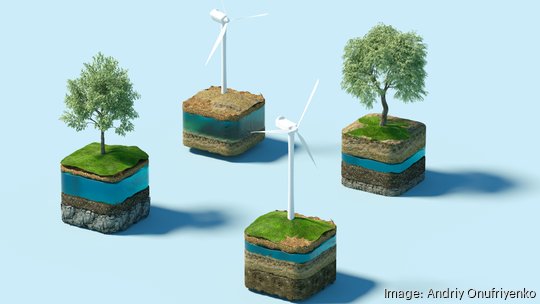
The federal government is rolling out new policies designed to reduce the country's carbon emissions that rely heavily on private sector investment.
But a big source of that investment — venture capital — has been drying up, according to a new report.
Since hitting a record high in the fourth quarter of 2021 at $14.9 billion, venture investment into startups working on climate-related technologies and businesses has declined in all but one quarter since, Silicon Valley Bank said in the report. In the first quarter it hit $5.8 billion, down 61% from the peak. And the number of climate-tech related venture deals in the U.S. has plunged every quarter since hitting a high of 545 in the first quarter of last year, dropping to 380 in the first quarter this year.
Meanwhile, the number of new climate-tech focused venture funds has fallen off a cliff, as has the amount of money raised by them. Across the country, venture investors closed just 18 new climate tech-related funds in the first quarter, down from 50 in the fourth quarter of 2021, according to the report. Those funds raised a combined $1.9 billion, down from a $7 billion in that last quarter of 2021.
Those drops reflect overall declines in venture investments and fundraising by venture firms, Silicon Valley Bank said.
"The reality is that (Federal Reserve interest rate) tightening, public market uncertainty and what has been reported as the worst performing vintage (of venture investments) in over a decade means that limited partners are slowing down investments into funds," SVB said in the report, published Monday.
The fall in climate-tech related deals varies widely by subsector. In the three-month period ending May 31, the number of deals in the mobility space was down 15% from the three-month period ending April 30, 2022, according to the report. Over that same period, the number of deals in the industrials subsector was down 16%.
By contrast, the number of deals in the financial technology subsector was off 50% and those in the food technology one 52%, according to the report.
"Nearly all verticals within climate tech have seen a (year-over-year) decline" in deals, SVB said.
The feds are counting on private investment
The fall in climate-tech funding and fundraising follows the enactment in 2021 of the Infrastructure Investment and Jobs Act and in 2022 of the Inflation Reduction Act (or IRA) and the CHIPS and Science Act. Over the next decade, those three federal laws will provide nearly half a trillion dollars in funding for climate technology and energy infrastructure, SVB said in the report.
The IRA alone is set to provide some $370 billion. But much of that amount comes in the form of household and corporate tax credits meant to spur investments in things like electric cars, heat pumps, solar panels and other forms of clean energy.
The new laws should help the U.S. reduce its carbon emissions by 1.1 gigatons a year by 2030, SVB said in its report. But to cut them down to the point where the country and world are not emitting any carbon dioxide on net — a step that's needed to avert cataclysmic climate change — private investment is going to be crucial, it said.
"Tech companies will play an important role in creating the efficiency gains needed to overcome the remaining gap," SVB said.
Despite the sharp drop in venture funding and fundraising, the bank found reasons for optimism.
The number of deals for climate-tech firms hasn't fallen as much as those for tech startups in general, according to the report. While the number of active investors in the sector has fallen markedly since the first half of last year, it's held up better than the broader tech sector. And while valuations have plunged in most tech sectors since 2021, they're actually up for climate-tech startups.
Some 44% of all deals in the climate-tech space are now in late-stage companies, compared to 35% in 2019. That's boosted the number of unicorns — startups worth $1 billion or more — in the space to 14 in the U.S. and 80 total worldwide. That late-stage investment is a sign that the sector is maturing and will be able to generate the revenue needed to support their valuations, according to the report.
"It is also a sign that investors are becoming more confident in the long-term prospects of climate tech," SVB said in the report. The sector's unicorns are "a testament to the growing demand for climate-friendly solutions."








